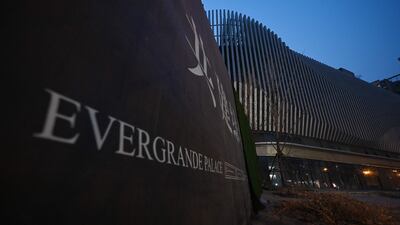Shares of China Evergrande Group’s offshore units are fluctuating after their heavily indebted parent received a liquidation order from a Hong Kong court, raising questions over their future ownership.
China Evergrande New Energy Vehicle Group shares fell by 13 per cent before trimming most of the losses.
Evergrande Property Services Group was down as much as 9 per cent before paring. While trading in the parent is still halted, the subsidiaries applied for a resumption after yesterday’s suspension.
The two units are some of Evergrande’s most prominent offshore assets, with a combined market value of $857.4 million as of Monday.
More than 90 per cent of the company’s assets are in mainland China, where Hong Kong’s courts have limited recognition, underscoring the challenges liquidator Alvarez & Marsal will face in working out the claims on the world’s most indebted-developer.
“The two subsidiaries of Evergrande will face lots of uncertainties as China Evergrande Group heads for liquidation,” said Raymond Cheng, head of China and Hong Kong research at CGS-CIMB Securities.
“Both companies will have difficulties in maintaining their business, which will dampen investor confidence.”
Evergrande’s offshore restructuring plan covers $17 billion of dollar bonds holders and $14.7 billion debt claims of other offshore liabilities, according to its restructuring document dated March. It has overall liabilities exceeding $300 billion.
Evergrande owns about 59 per cent in New Energy Vehicle and about 50 per cent in Property Services, according to Bloomberg-compiled data.
Whether the court’s reach will extend to Evergrande’s assets in mainland China remains to be seen, as most of its projects onshore are operated by its local units that may be hard for the offshore liquidator to seize.
“It’s hard to know whether the HK ruling results will be implemented well in mainland China and it may take time,” said Mr Cheng.
However, Hong Kong has a mutual recognition agreement on insolvency and restructuring with the Supreme People’s Court of China that applies in parts of the country, including Shanghai, Shenzhen and Xiamen, UBS analysts including John Lam wrote in a note.
The winding-up order may apply to its assets in these cities, he said.
A Bloomberg gauge of Chinese developers fell by as much as 2.6 per cent on Tuesday.
The shares of China Evergrande Group plunged 21 per cent before trading was suspended following the court’s order.
The builder was valued at only $275 million on Monday, down more than 99 per cent from its peak.
Trading in Evergrande shares will remain halted until further notice, according to a company filing to the Hong Kong stock exchange.
“Evergrande’s liquidation is set to deal another blow to China housing sentiment as it negates recent policy efforts to prop up the market by easing loan rules and property-project financing, and rolling back home-purchase curbs,” Bloomberg Intelligence analyst Kristy Hung wrote in a note.
Stock markets
Meanwhile, China’s equities and bond markets are giving a clear signal to policymakers that they need to take more steps to revive investor confidence.
A sell-off in stocks resumed Tuesday, cutting short last week’s rebound driven by hopes of a market rescue package. A benchmark government bond yield slid to the lowest in nearly 22 years, underscoring expectations that the People’s Bank of China will unveil more monetary stimulus to boost growth.
The gloom over Chinese economy deepened this week as the liquidation of debt-ridden Evergrande Group intensified concerns about the embattled real estate sector.
The Hang Seng China Enterprises Index, a gauge of Chinese stocks listed in Hong Kong, declined by as much as 2.7 per cent on Tuesday to become the worst performer in Asia.

